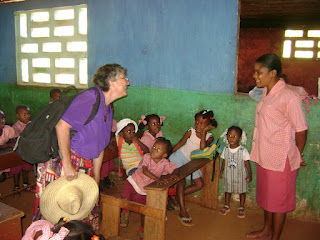Getting Personal
We at TVI are a small organization with a big mission. We go to small villages in a small country, and we save lives. Here are a few stories of the men and women in Haiti serving in vital roles across the Pestel region and the people whose lives they touch...
Name: Sister Fidelis Rubbo
Hometown: Ferrier, Haiti and Garden City, Michigan, USA
Job: Director of the Sylvania Franciscan Haiti Mission
Favorite food: Any kind of shell fish
Favorite Bible Verse: I have many, but one is "I will be with you always even to the end of time." Spoken by Jesus at his Ascension, it reminds me that the work I do is His and that He will always be with me no matter what.
Hobbies: Energized walking, watching tennis, visiting friends, and reading fiction
If you could correct one misconception about Haitians, what would it be? I'd change the perception that poor people are lazy and that they're poor because they're not trying hard enough. Other countries have hampered Haitian progress from the beginning of their history. They've suffered invasions, embargos, election tampering, a foreign country supporting a coup against the elected president, and even the indignity of France asking them to pay back the money they'd lost to free the slaves.
In Brief
Sister Fidelis Rubbo moved to Pestel, Haiti, in October, 2001, feeling drawn by the immense needs that weren't being met. She began to work in pastoral care, and serve as administrator of the dispensary in Ferrier, deep in the mountains along Haiti's southern peninsula. "I immediately felt at home," she said. "People were so grateful, and festive." Every class they visited sang a song for them, and the children followed them from class to class. She thought, "Wow, I'd love to help them have a better future." As she learned about the people and culture, she broadened her scope to include economic development.
There are some 10,000 aid organizations in Haiti, yet very few were in the hard-to-reach rural area of Pestel. It was heart-breakingly easy to make a difference. "I remember one girl, Benia, who came to the clinic when she was 9-years-old. She was pencil-thin, and we thought she had irreversible retardation because of malnourishment." During play therapy, tossing a ball around a circle of children, Benia didn't respond. The ball just bounced off her. But eventually, she laughed. That was a breakthrough, and after several months of care, Benia was talking. Finally she made a full recovery. Usually, it takes the younger kids about two months to recover. "It's wonderful to see."
In essence, Sister Fidelis' work in Pestel is to lift people up physically, economically, and spiritually. On any given day, she could be arranging for the construction of the new guest house, helping to get a chateau d'eau (for clean water), planning with Sister Jo and the Haitian leadership team, receiving people at her front gate, checking on the clinic in the next village, or leading worship.
"I love to lead prayer," she said. "The prayers are so beautiful, it's easy to be inspired yourself."
Of her timeline in Haiti, Sister Fidelis says, "I'm in for the long haul. I intend to stay in Haiti as long as God gives me good health and continues to call me there. Yet we're also training Haitians to take over."
In Her Own Words:
"If all that we're building falls apart, what endures? The relationships, the leadership skills, the training for people to impact their own community. Yes, we can give food and medicine, but ultimately you affect one person at a time. We hope that the work continues, but how we have touched people personally by our presence, and the faith, skills, and attitudes that we've developed together will endure in the human spirit from one generation to the next. I went to Haiti thinking I want to share God's love with these people, and let them know there are people in other countries who care. Now, I also think it's important for people in the U.S. to experience the Haitian people and culture, their challenges and faith. They too have much to teach us."
http://thrivingvillages.blogspot.com/







No comments:
Post a Comment